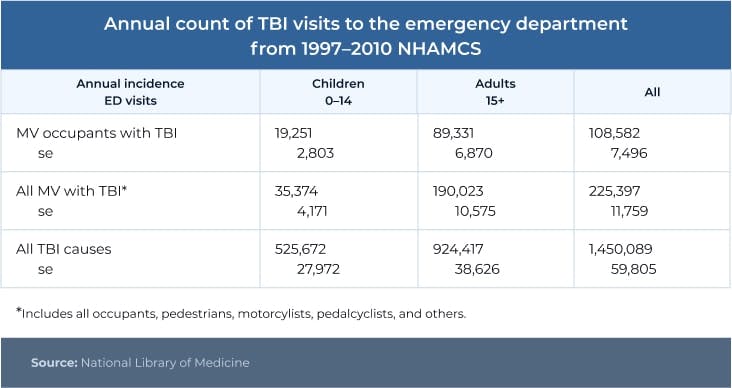
Whether you have a mild traumatic brain injury (TBI) or your loved one has a moderate or severe TBI, it’s important to know the prognosis. While you should always seek answers from medical doctors, you should be reassured to know that many people can make a full recovery from head injuries.
Many individuals suffer traumatic brain injuries due to the negligence of another party. If this happened to you, you might be entitled to damages for your medical expenses, lost wages, and pain and suffering. The Pendergrass Law Firm, LLC helps TBI patients with their recovery by ensuring that they have the resources they need. Call today for a free, no-obligation consultation for you or your loved one.
What Constitutes a Traumatic Brain Injury (TBI)?
Traumatic brain injury is a catch-all for a variety of injuries to the head. A mild TBI can be caused by a slight blow to the head. This may temporarily damage the nerve cells, but a full recovery is much more likely. A moderate TBI or severe TBI can result from a disruption to the brain tissue, such as torn tissue, bleeding, severe bruising, etc.
This can be a bit confusing since TBI is the same term that can be used for a mild concussion caused by a bump on the head or severed tissue from a bullet passing through the brain tissue. If you have a head injury, whether you believe your health is in jeopardy or not, you should contact your doctor immediately.

Signs and Symptoms of Traumatic Brain Injuries
With a severe traumatic brain injury, it’s likely to be discovered pursuant to an examination for other conditions. However, with a mild case, patients may be unaware that they have any kind of brain damage until they have a full examination.
Here are some of the signs of traumatic brain injuries at different levels:
Mild TBI Symptoms
In mild cases, physical symptoms can include headaches, nausea or vomiting, slow verbal response, problems with articulation, drowsiness or fatigue, and dizziness. Additionally, patients may experience sensory issues, like blurred vision, ear ringing, and issues with taste and odor.
A mild TBI can also affect behavior and the ability to think. For example, patients may lose consciousness for brief periods, find it difficult to concentrate, feel confused, have difficulty sleeping, and more.
Moderate to Severe TBI Symptoms
While all of the symptoms of a mild concussion or TBI can manifest themselves in more serious cases, physical symptoms can include longer lapses of consciousness, severe and persistent headaches, repeated vomiting, seizures and convulsions, pupil dilation and sensitivity to bright light, inability to wake up from sleep, numbness in the extremities, and loss of coordination. Cognitive symptoms include intense confusion, belligerent behavior, post-traumatic amnesia, slurred speech, and more.
Of course, there is no limit to the way that a severe head injury can affect patients. Injury-related deaths are common, and many survivors remain in a persistent vegetative state. Fortunately, there are favorable outcomes for brain injury patients, and the abilities of medical professionals are constantly improving.
Traumatic Brain Injury Statistics
The U.S. Centers for Disease Control and Prevention (CDC) track the number of traumatic brain injuries in the United States. Their most recent data comes from 2019 and 2020.
In 2019, there were 223,135 hospitalizations resulting from TBIs and 64,362 deaths related to brain injury. This translates to 611 TBI hospitalizations and 176 deaths each day.
Main Causes of Traumatic Brain Injuries
According to the CDC, the most common causes of traumatic brain injury are:
- Falls – About 50% of all TBI-related emergency department visits are due to falls.
- Firearm Related Suicide – This is the number one cause of injury related TBI deaths in the United States.
- Motor Vehicle Accidents – During a study period of 13 years by the National Institute of Health, there were approximately 50,000 emergency room visits due to TBIs.
- Assaults – Physical battery is another prevalent reason for TBIs in the United States.
According to a 13-year study from the National Institute of Health, car collisions were the leading cause of TBIs and traumatic brain injuries were more prevelant in adults.

Of course, nearly any type of intentional or unintentional impact to the head can result in a TBI, including the type one might sustain playing sports.

Factors That Influence Brain Injury Recovery Outcomes
Several factors can affect the health and recovery of TBI patients.
Severity of the Injury
The severity of a TBI is the primary factor that can affect recovery. With all other factors being equal, a gunshot wound typically has a lower recovery rate than a cerebral edema from a car accident.
Risk by Age
TBI accidents disproportionately affect individuals 75 years of age or greater. During the 2019 to 2020 data period, 32% of TBI hospitalizations and 28% of TBI deaths occurred in this age demographic. Children under the age of 18 are also greatly affected. 16,070 of the annual TBI injuries occurred in children ages 0 to 17, and 2,774 TBIs resulted in the death of children ages 0 to 17.
Risk by Gender
According to the CDC data, males were twice as likely to be hospitalized due to a traumatic brain injury and three times as likely to die from a TBI. These statistics are adjusted for age.
What You Should Do if You Sustain a TBI
The following information is not legal advice. For a full discussion about the legal ramifications of your traumatic brain injury, contact Pendergrass Law in the Atlanta area or search for a “personal injury attorney near me” if you are outside of this region.
- Go to the Emergency Room – Early detection is a key factor in patient recovery, and emergency departments are staffed with doctors who can easily identify traumatic brain injury.
- Follow Up With Your Doctor – After you are discharged, you need to tell your doctor that you have a TBI or suspect that you do.
- Inform Others – TBIs can be dangerous. If you live independently, you may need to consider hiring a home healthcare professional for the near term. You may experience mental and physical issues that will make living alone difficult.
- Contact a Personal Injury Attorney – The issues resulting from a TBI range from discomfort to minor disability to death. A personal injury attorney can help you recover more than just your medical expenses. You may be entitled to compensation for all bills related to the recovery of your health, lost earnings and future lost wages, diminished capacity, mental trauma, physical pain, and more.
Do not accept an insurance company settlement without first speaking to a personal injury lawyer who handles TBI recovery. Georgia insurance companies are often quick to settle TBI claims because they know that damage awards can be substantial. If you accept an insurance settlement, you’ll have to sign a waiver that will prevent you from seeking additional damages in the future.
Atlanta Area TBI Injury Attorney
For years, the Pendergrass Law Firm has been helping victims from all age groups recover from head injuries and TBIs. If you have sustained a blow to the head or a penetrating head wound, you need to go to the emergency room. Once the immediate perils have passed, contact Pendergrass Law to discuss your case. All consultations are free, and we work on a contingency basis, so you never have to pay out of pocket for our professional legal advice. Call now for immediate and diligent representation.


